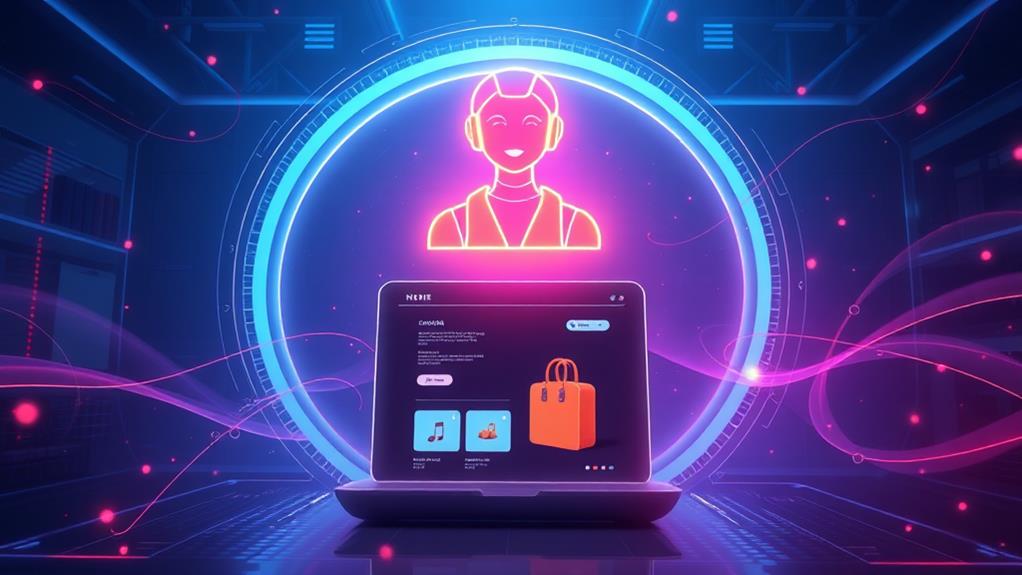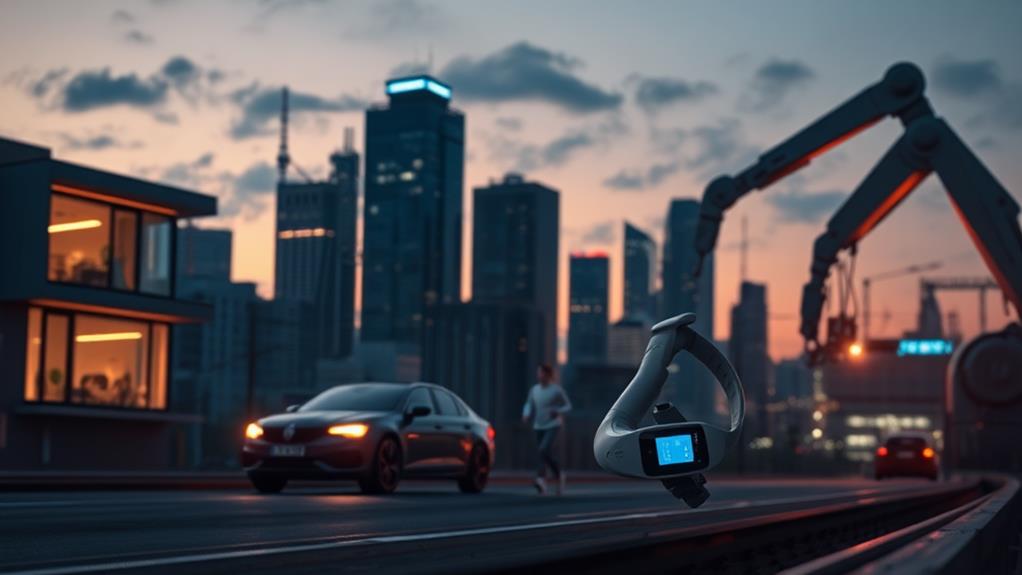You might think you’re familiar with AI’s role in your daily routine, but chances are, you’re only scratching the surface. From the moment you wake up, AI is working behind the scenes to make your life easier, more efficient, and more enjoyable. Your virtual assistant is learning your habits, your smart home devices are adapting to your preferences, and your online shopping experiences are being tailored to your interests. But that’s just the beginning. As you’ll soon discover, AI’s impact extends far beyond these obvious examples, and its surprising applications are changing the way you live, work, and play in ways you never thought possible.
Key Takeaways
- AI in virtual assistants learns user patterns and habits to refine responses and streamline tasks, making daily routines more efficient.
- AI-powered smart home devices adapt to daily routines, adjusting lighting, temperature, and security settings for a more comfortable living space.
- AI-driven fitness apps offer personalized workouts and progress tracking, helping users achieve their fitness goals more effectively.
- AI-powered chatbots in e-commerce automate routine customer inquiries, providing faster and more personalized support to online shoppers.
- AI-generated music compositions create new sounds and styles, expanding musical possibilities and enhancing entertainment experiences.
AI in Virtual Assistants
Virtual assistants, powered by intricate AI algorithms, have become an indispensable part of daily life, adapting to your patterns and habits to refine their responses and streamline tasks.
These AI-powered virtual assistants can perform tasks such as setting reminders, sending messages, and controlling smart home devices, freeing up your time for more important activities.
By using machine learning algorithms to analyze your behavior, they provide personalized support and assistance, making them an integral part of your daily routine.
With natural language processing algorithms, virtual assistants like Amazon’s Alexa and Google Assistant can understand and respond to voice commands, allowing you to control smart home devices, set reminders, and access information with ease.
Furthermore, they can learn your habits and preferences, providing personalized recommendations and improving your overall user experience.
For instance, clear prompts and suggestions guide users through conversations, helping them achieve their goals.
Additionally, virtual assistants can collect valuable data and user insights to enhance products and services.
With AI-assisted virtual assistants, you can schedule appointments and reminders with 95% accuracy, making them a reliable tool for managing daily tasks and routines.
Smart Home and City Innovations

As you rely on AI-assisted virtual assistants to streamline your daily tasks, it’s likely you’re also benefiting from the innovations they bring to your living space.
AI-powered smart home devices can learn and adapt to your daily routines, adjusting lighting, temperature, and security settings to create a personalized and energy-efficient environment. This results in a 20% reduction in energy consumption, contributing to a more sustainable living environment.
In addition, AI-generated visuals are used in e-commerce to create high-quality product images, resulting in increased sales and customer engagement AI-driven visual content.
In fact, AI technology saves up to 90% of the time and resources required for traditional design processes, making it an attractive solution for businesses and individuals alike.
In smart cities, AI is used to optimize traffic flow, reducing congestion by up to 25% and lowering travel times by up to 20%, as seen in cities like Singapore and Barcelona.
AI-driven traffic management systems analyze traffic patterns and optimize traffic signals, ensuring smoother commutes and reducing frustration in your daily lives.
Additionally, AI-powered smart energy management systems can predict and optimize energy consumption in buildings, resulting in up to 30% energy savings.
AI-Powered Health and Wellness
In the domain of health and wellness, AI-powered technologies are revolutionizing the way you take care of yourself. With machine learning algorithms analyzing your behavior and health metrics, you can receive personalized fitness coaching and tailored wellness plans.
| AI-Powered Health and Wellness Applications | Benefits |
|---|---|
| AI-driven fitness apps | Personalized workouts and progress tracking |
| Wearable devices and wellness apps | Detailed health picture and anomaly detection |
| AI-powered health devices | Proactive lifestyle change alerts and preventative care |
These technologies enable early detection of health issues, improving the accuracy of diagnoses and reducing healthcare costs. AI-powered wellness coaches create customized fitness plans based on your fitness levels, goals, and preferences. Additionally, AI-based chatbots provide round-the-clock accessibility to healthcare professionals, ensuring timely intervention and improved survival rates. With AI-powered health and wellness, you can take control of your health and make informed decisions about your wellness.
Intelligent Online Shopping Experiences

Through advanced machine learning algorithms, online shopping platforms are revolutionizing the way you browse, purchase, and interact with products.
These algorithms analyze your browsing history, purchase patterns, and search queries to provide personalized recommendations, making your online shopping experience more efficient and enjoyable.
Additionally, AI-driven chatbots can automate up to 80% of routine customer inquiries, freeing up human customer support agents to focus on complex issues, and can help reduce customer support expenses by up to 30%.
- Personalized product suggestions: AI-powered algorithms analyze customer data to forecast user preferences, enabling e-commerce platforms to provide tailored product suggestions and promotions, increasing the likelihood of sales and customer satisfaction.
- Efficient customer support: AI-driven chatbots and auto-responses speed up communication, reducing typos and making online interactions more efficient and personalized.
- Visual search capabilities: AI-driven image recognition technology enables visual search, allowing you to upload images of products you’re interested in and receive similar product suggestions.
AI-Driven Entertainment and Leisure
How has AI transformed your leisure time? AI-driven entertainment and leisure experiences have revolutionized the way you enjoy your free time.
AI algorithms analyze your behavior and preferences to provide personalized entertainment experiences. For instance, music streaming platforms like Spotify use AI to curate playlists and recommend new songs and artists based on your listening habits.
In video games, AI-powered chatbots create immersive experiences by generating non-playable characters that can converse with you. AI-driven content generation also creates personalized thumbnails and titles for shows and movies on platforms like Netflix, enhancing your user experience.
AI systems can be categorized into narrow or weak AI, general or strong AI, and superintelligence Machine Learning Models, which are used in various applications, including entertainment. Additionally, AI is used in social media marketing to analyze user behavior and create targeted advertisements, which can also influence entertainment choices.
Virtual assistants like Alexa and Google Assistant can be integrated with smart home devices to provide voice-controlled entertainment experiences, such as playing music or streaming videos. Furthermore, AI is being used in the development of virtual and augmented reality experiences, enabling the creation of more realistic and interactive environments in gaming and entertainment.
Additionally, AI-generated music compositions create new sounds and styles, expanding musical possibilities. Overall, AI has transformed your leisure time by providing more immersive, interactive, and personalized experiences.
Frequently Asked Questions
What Examples of AI Do We Use in Daily Life?
You use AI daily through virtual assistants like Siri, language translation apps like Google Translate, and health apps like Fitbit, which provide personalized services, automate tasks, and optimize your daily routines, making your life more efficient and convenient.
What Are Some Real Life Examples of General Ai?
You’re likely familiar with narrow AI, but general AI examples are harder to find. Currently, there aren’t many real-life examples of general AI, as it’s still in development, but you’ll see it in future applications like robots that can learn and adapt like humans.
What Are Ways AI Is Used Today?
You’re about to decipher the secrets of AI, like a master key fitting perfectly into a lock. Today, you use AI when you ask virtual assistants for help, when doctors analyze medical data to detect diseases, and when businesses employ chatbots for 24/7 customer support.
What Is One Place Where You See/Use AI in Your Everyday Life?
You likely see AI in your daily life through virtual assistants like Siri or Google Assistant, which use intricate algorithms to refine responses, streamlining tasks and making home automation easier, and continually adapting to your voice commands.
Conclusion
As you navigate your daily routine, AI is quietly pulling the strings, weaving a tapestry of convenience and personalization. Like a master conductor, it harmonizes the rhythm of your life, from virtual assistants to smart homes, and from health to entertainment. With each interaction, AI fine-tunes its symphony, creating a world that’s increasingly in tune with your needs.

